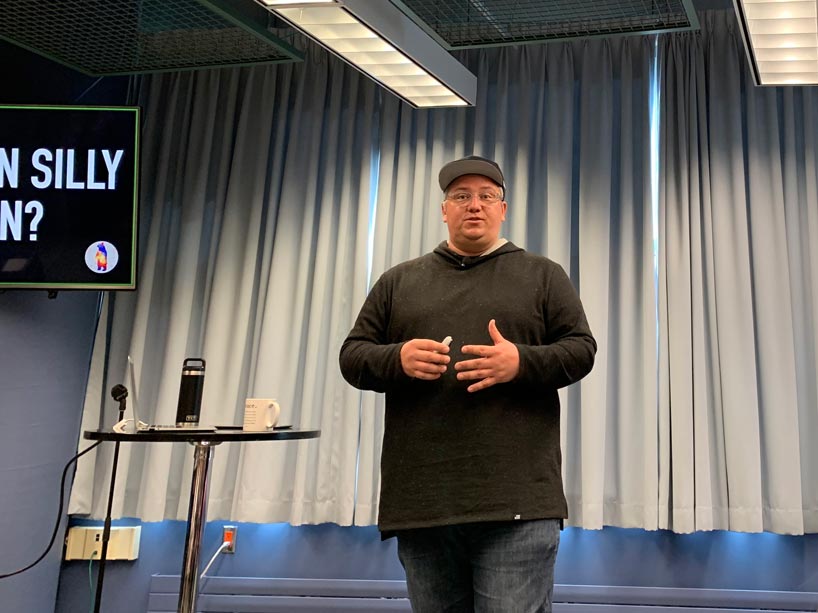A tale of powerful storytelling

Ryan McMahon, Anishinaabe comedian and writer, was the speaker at this year’s Atkinson lecture at the School of Journalism.
“The act of storytelling, I think, is a profound, beautiful, radical act of love.”
Anishinaabe comedian and writer, Ryan McMahon, shared this insight at the Atkinson lecture, on April 4, at the Rogers Communication Centre.
It was a hopeful moment in an otherwise grave, urgent, yet occasionally hilarious, conversation with Ryerson’s School of Journalism students on the role mainstream media can play in reversing false and dangerous narratives about Indigenous people in Canada.
“In that exchange, in that act of love, the act of remembering is a profound political act,” McMahon added: “When Indigenous people sit together to remember, they are rebuilding their communities.”
His talk, “We Become The Stories We Tell Ourselves,” explored storytelling not only as a fervent exposition of love, but also as one tied to power: Who has the privilege of telling stories in this country? What effects have these stories had on the national imagination?
Most importantly, McMahon asked, how can mainstream media ensure that it represents Indigenous voices, but also gets things right?
“We’re in this era of ‘reconciliation,’ but that word, just like ‘decolonize,’ has completely lost its power,” McMahon said. He explained that, in the rush to undo some of the damage that’s been done to Indigenous communities over the past 150 years, journalists have often fallen into the trap of not doing enough research and getting things wrong and, in the end, inflicting more damage on the people they intended to serve.
“If we just jump on the reconciliation hype train, without thinking too much about where it’s going, I fear we run the risk of recolonizing not just Indigenous stories, but Indigenous storytellers.”
He later added: “It will take us time. It should take us time if we want to get it right.”
McMahon further illustrated his point by discussing his popular Canadaland podcast, Thunder Bay (external link) . The podcast was a deep dive into the northern Ontario city — McMahon’s hometown. It explored how, beneath the veil of its quaintness and postcard scenery, Thunder Bay is also a site of political corruption, systemic racism and violence against Indigenous people.
McMahon explained that his sources for the podcast trusted him with their stories because he took his time to learn as much as he could, to get the full picture, rather than rushing through interviews and research to complete the process.
One of Thunder Bay’s greatest successes, he mused, was that it was “a mainstream story told through an Indigenous lens."
Still, in spite of the show representing a greater shift toward reconciliation, McMahon lamented his having to spend much of the podcast proving colonization was real in the first place.
“As Canadians, we don’t even want to talk about colonization,” he said. “If we close our eyes and pretend this country wasn’t built on colonization, I don’t know where we go from there.”
Evading the difficult stories about our country’s colonial project has been instrumental in completely erasing Indigenous people from the historical record, he said.
McMahon also explained that there is an “over-conflation” of the work the government is doing compared with the actual progress of the project of reconciliation.
“Most Canadians don’t care,” he said, citing a poll that found 48 per cent of Canadians thought the government was pushing “too hard” on reconciliation.
Territorial acknowledgments, he explained, are not enough. As it stands, the few journalists in Canada who are doing the work of telling these stories often find themselves overworked and under-resourced. But storytelling is where we need to invest: McMahon believes in the power of stories, and that “our lives come back with the stories that we tell.”
“Indigenous storytelling is the fastest way forward in this country,” McMahon said. “I don’t believe it’ll be a prime minister. It certainly won’t be a national chief. But it will be us.”
ICYMI: The lecture was recorded on Ryecast at ryecast.ryerson.ca/64/Watch/15417.aspx.